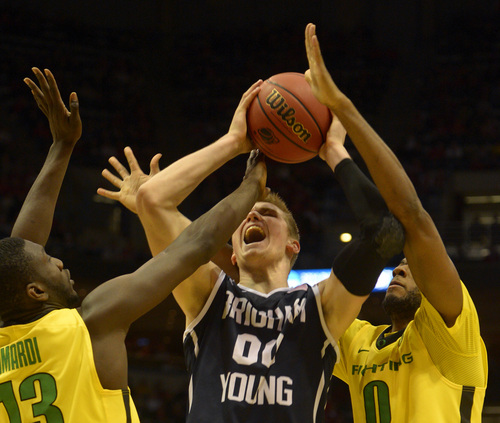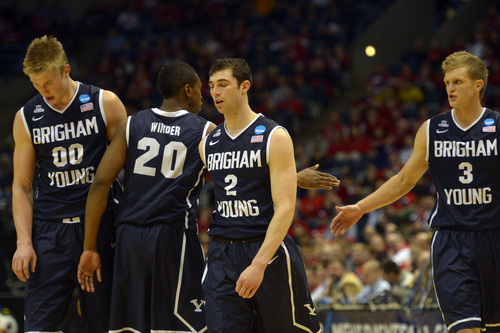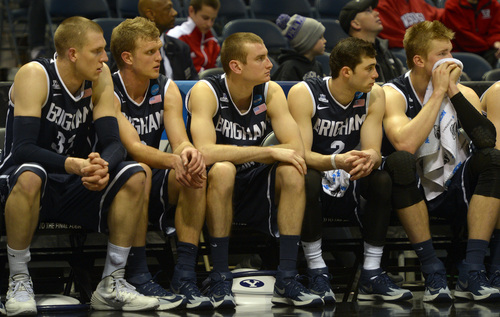This is an archived article that was published on sltrib.com in 2014, and information in the article may be outdated. It is provided only for personal research purposes and may not be reprinted.
Everybody's complaining.
But they know in their hearts they shouldn't.
Everybody wants college basketball improved.
But the price for that improvement is too steep.
Basketball is stuck, then, wedged between three despised words and one undeniable fact:
• One and done.
• Some wrongs must be endured in the name of greater rights.
Nearly a decade ago, the NBA came up with its rule that disallowed high school players from entering the draft. Prospects had to be 19 or finish their freshman year of college. And since then, the college game has suffered because its best athletes blow on through in a flash. They arrive on campus long enough to drink a couple of Gatorades and then duck on down a back alley to fulfill their dreams and fill their bank accounts.
That created — and goes on creating — some problems.
It makes a mockery of the already hypocritical term: student-athlete. Guys essentially show up for classes for a semester and that's it. For a minute, they have one foot in the gym, one foot on campus, and a minute later, they have two feet in the gym and then two feet out the door. They aren't interested in a college education. They're simply satisfying the rule and moving on.
A few college coaches, such as Kentucky's John Calipari, have thrived with that setup, accepting it and using it in volume to win games and rotate on through to the next group. Others have suffered, able to recruit some top talent, but unable to mold the kind of team they ordinarily would because of the short clock. In either case, the game itself deteriorates because few individual players or groups of players attain what they would have over a longer period of time while continuing on as college players. Instead, that continuity is ruptured and, too often, the game is left in the hands of the unprepared and the less talented.
Pretty simple.
What isn't so simple is fixing it — without implementing rules that run straight into the teeth of the American way. If a free market is celebrated, the rule should be rolled back, not made more restrictive. If a high school player is seen as a bright enough prospect, and business (team) owners are willing to pay him millions of dollars to be employed by them straightaway, why shouldn't he be permitted to go to work?
There are some essential occupations, perhaps, that require age limits due to a range of safety or critical-judgment issues, but playing basketball hardly fits into that category.
If someone wants to pay high school grads, and high school grads want to play, why shouldn't they be allowed to sign their deals? It's ridiculous, it's un-American, that they cannot. Why should they be forced to pretend to be college students for a year — or head overseas — if the willing owners' checkbooks are open for them immediately?
It shouldn't be the athletes' responsibility to preserve and make better the college version of the game, or make money for college programs, for coaches who get huge bonuses for going deep in the tournament, for the NCAA, which pockets millions and billions, while the athletes get scholarships — taken away from conscientious students — they might not want and have to fake it as students long enough to satisfy a trumped-up order.
Some have suggested implementing Major League Baseball's rule, which allows prep players to enter baseball's draft, but if they go first to college, they become ineligible until after their junior year.
At first glance, that seems reasonable enough, but upon further review: Why should young athletes, even those who originally want to go to college, be trapped in a box, a box that greatly favors the powers that be in the NCAA, a box that makes money off those athletes but is unwilling to share with them the cash that it gains?
Here's an idea: Let athletes ply their trade when individual teams and team owners are willing to pay them.
So college basketball suffers with the already too imposing one and done. Pro basketball might suffer, too, at least in some cases initially, from athletes still needing to grow.
But we do live in America, right?
Let freedom ring.
GORDON MONSON hosts "The Big Show" with Spence Checketts weekdays from 3-7 p.m. on 97.5 FM/1280 and 960 AM The Zone. Twitter: @GordonMonson.







